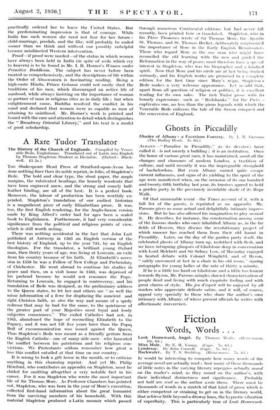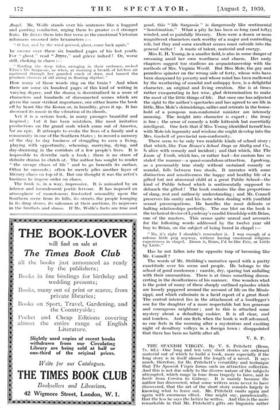Fiction
Words, Words . . .
Look Homeward, Angel. By Thomas 1Volie. (Heinemann.
10s. (hi.)
Miss Mole. By E. H. Young. (Cape. 7s. 6.1.)
Lyndesay. By John Connell. (Cape. 7s. Od.) Backwater. By T. S. Stribling. (Heinemann. is. 6d.)
IT would be interesting to compute how many worth; of the
average novel are actually read ; how many of it limns:olds of little notes in the varying literary arpeggios actually sound on the reader's mind, as they sound on the author's, with
their individual distinctness and significance. Probably not half are read as the author wrote them. There must he thousands of words in a stretch of that kind of prose which is either competent or straining to get on in the literary world, that achieve little beyond a drowsy hum, the hypnotic vibration of superfluity. This is particularly true of Look Homeward,
Angel. Mr. Wolfe stands over his sentences like a haggard and panting conductor, urging them to greater and stronger feats. He drives them into free verse as the emotional Victorian reformers swooned into hexameters :- " 0 lost, and by the wind grieved, ghost, come back again," be croons over these six hundred pages of his lost youth. For " ghost " read " Joyce," and grieve indeed ! Or, worse still, choking in chaos :-
" Roofing the deep tides, swinging in their embrace, rocked Eliza's life flargassic, as when, at morning a breath of kitchen air squirmed through her guarded crack of door, and fanned the pendant clusters of old string in floating rhythm."
How many of those words ring on the brain ? And when there are some six hundred pages of this kind of writing in varying degree, and the drama is decentralized in a score of characters and hundreds of disconnected scenes which are given the same strident importance, one either learns the book off by heart like the Koran or, in humility, gives it up. It has drowned its music in the vibration of its chords.
Vet it is a serious book, in many passages beautiful and inspired ; Lut it has been mistaken, like most imitative productions on the grand scale which come out of America, for an epic. It attempts to evoke the lives of a family and a community in one of the Southern States ; to record a memory of the day to day business of struggling to earn a living, playing with opportunity, scheming, marrying, dying, and day-dreaming in the corridors of a few people's lives. It is impossible to describe such a book ; there is no straw of definite drama to clutch at. The author has sought to render " the savage chaos of life " and to go beneath its surface. Often he succeeds ; often he merely piles another layer of literary chaos on top of it. But one thought it was the artist's business to impose order on chaos.
The book is, in a way, impressive. It is animated by an intense and incandescent poetic fervour. It has imposed an atmosphere of monotonous frustrated sensuality upon the Southern scene from its hills, its streets, the people lounging in its drug stores, its salesmen at their auctions, its negresses in the brothels and slums. If Mr. Wolfe's facts are true and good, this " life Sargassic " is dangerously like sentimental " borabination." What a pity he has been so long (and lofty) winded, and so painfully literary. Here were a dozen or more magnificent characters each worthy of a major and controlling ride, but they and some excellent scenes must subside into the general welter ! A waste of talent, material and energy.
Miss E. H. Young, in a smaller field, is also in some danger of swooning amid her own wordiness and charm. Her early chapters suggest too studious an acquaintanceship with the methods of Mrs. Virginia Woolf. But Miss Mole, the gay and penniless spinster on the wrong side of forty, whose wits have been sharpened by poverty and whose mind has been mellowed by the weathering of scandal and unhappy love, is a delightful character, an original and living creation. She is at times rather exasperating in her wise, glad determination to make the most of the little things of life. But once one has adjusted the sight to the author's spectacles and has agreed to see life in little, Miss Mole's skirmishings, sallies and retreats in the house- hold of a pompous non-conformist minister are intensely amusing. The insight into character is expert ; the irony is fine ; the sense of comedy a trifle kittenish but essentially intelligent. One feels that if Miss Young identified herself less with Mole-ish ingenuity and wisdom she might develop into the Mrs. Gaskell of provincial non-conformity.
There seem to be only two readable kinds of school story that which, like Tom Brown's School Days or Stalky and Co.,
is alive with comedy and incident ; and that which, like The Loom of Youth, which has, or rather had—for custom has so staled the manner—a quasi-scandalous attraction. Lyndesay, as a presumably true study without sustained comedy or scandal, falls between two stools. It narrates with some distinction and sensitiveness the happy and healthy life of. a gifted but not abnormal child at a great Public School—the kind of Public School which is sentimentally supposed to debauch the gifted ! The book contains the due proportions of slang, zest and author-ly understanding ; and Mr. Connell preserves his sanity and his taste when dealing with youthful sexual preoccupations. He handles the most delicate or halting relationships perfectly. The one blot on the book is the technical device of Lyndesay's candid friendship with Brian, one of the masters. This seems quite unreal and accounts for the following words addressed by the twelve year old boy to Brian, on the subject of being bored in chapel :—
" No, it's right I shouldn't remember it. I was enough of a solemn little prig anyway, without having emotional religious
experiences in chapel. Damn it, Brian, be like Eric, or Little by Little."
Has he not fallen into the opposite trap of becoming like Mr. Connell ?
The words of Mr. Stribling's narrative speed with a pretty exactitude over his scene and people. He belongs to the school of good marksmen : caustic, dry, sparing but unfailing with their ammunition. There is at times something discon- certing in the desultoriness of his manner. One wonders what is the point of many of these sharply outlined episodes which are loosely peppered around the account of life on the Missis- sippi, and which culminate in a lucid report of a great flood. The central interest lies in the attachment of a bootlegger's son for the daughter of a more respectable but less generous and courageous neighbour ; and to this is attached some mystery about a defaulting cashier. It is all clear, cool and toneless. And one feels when the book is well advanced, as one feels in the morning after a mysterious and exciting night of desultory volleys in a foreign town : disappointed that there has been no battle after all.
V. s. P.

































 Previous page
Previous page